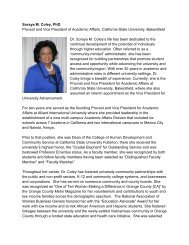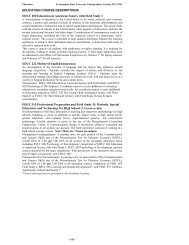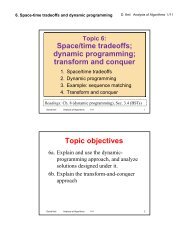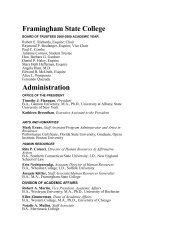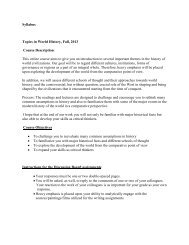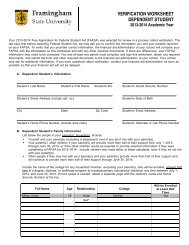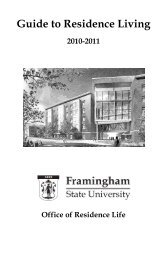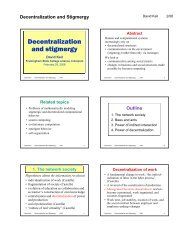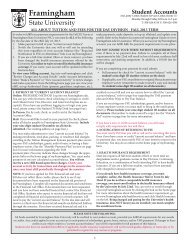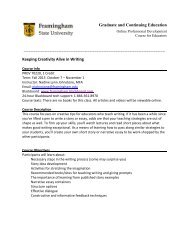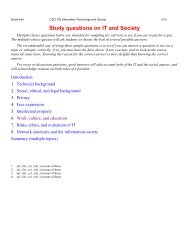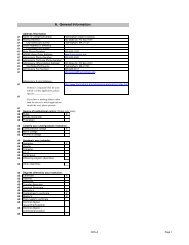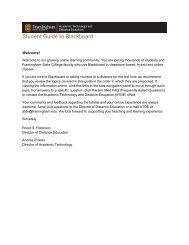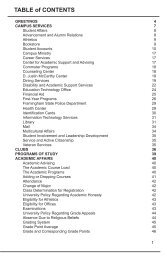Elaine (Spurling) Alden '92 '96G - Framingham State University
Elaine (Spurling) Alden '92 '96G - Framingham State University
Elaine (Spurling) Alden '92 '96G - Framingham State University
Create successful ePaper yourself
Turn your PDF publications into a flip-book with our unique Google optimized e-Paper software.
12<br />
FSU Students Spend Spring<br />
Break Aiding Tornado<br />
Victims in Joplin, MO<br />
A group of 23 students from <strong>Framingham</strong><br />
<strong>State</strong> <strong>University</strong> spent spring break in<br />
March forging lasting friendships and<br />
aiding victims in tornado-ravaged Joplin,<br />
MO, as part of the Alternative Spring<br />
Break program.<br />
The students raised around $25,000<br />
to cover travel and lodging expenses<br />
for the weeklong trip. They teamed<br />
with Project195 on the effort,<br />
an action-based charity and relief<br />
organization. Student Team Leaders<br />
Kendra Sampson ’12, Molly Goguen ’13<br />
and Krista Landry ’12 described the<br />
experience as transformative.<br />
“It’s an incredible feeling to be able to<br />
help someone who’s really in need,”<br />
Landry says. “A lot of the students on<br />
the trip didn’t know each other when<br />
we left and were pretty timid at first, but<br />
we returned feeling like one big family.”<br />
A massive tornado struck Joplin on May<br />
22, 2011, killing 160 people and causing an<br />
estimated $3 billion in damage. Students<br />
spent the week renovating the home of<br />
one family. Work included clearing debris<br />
from the yard; creating a garden;<br />
repairing much of the inside of the home;<br />
and scraping, sanding and painting the<br />
exterior of the home.<br />
“The homeowner was incredibly thankful,”<br />
Sampson says. “She would come out and<br />
talk with us each day and let us know<br />
how much it meant to her.”<br />
FraMinghaM <strong>State</strong> UniverSity fall 2012<br />
President Flanagan Participates<br />
in Education Policy Roundtable<br />
at White House<br />
Focus of Discussion is<br />
on College Accessibility<br />
and Affordability.<br />
Policy advisors for President Barack Obama<br />
recently hosted <strong>Framingham</strong> <strong>State</strong> President<br />
Timothy J. Flanagan and other public college<br />
and university presidents from around the<br />
country for a roundtable at the White House<br />
on the topics of college access, affordability<br />
and completion.<br />
“This was a great opportunity for face-to-face<br />
dialogue between White House officials and<br />
leaders of America’s four-year public colleges<br />
and universities about critical issues of access,<br />
affordability and achievement,” President<br />
Flanagan said.<br />
The presidents who participated are all<br />
members of the Council of <strong>State</strong><br />
Representatives of the American Association<br />
of <strong>State</strong> Colleges and Universities (AASCU),<br />
a Washington-based association representing<br />
420 public higher education institutions. As<br />
Massachusetts’ representative on the council,<br />
Dr. Flanagan works directly with the organization<br />
to develop its national policy agenda<br />
and helps keep the group informed about<br />
higher education policy issues.<br />
The 90-minute discussion was led by<br />
President Obama’s Senior Education Advisor<br />
Zakiya Smith; Deputy Secretary of the<br />
U.S. Department of Education Tony Miller;<br />
Director of the White House Domestic<br />
Policy Council Cecilia Munoz; ˜<br />
and<br />
Council of Economic Advisors Member<br />
Katharine Abraham.<br />
President Obama’s administration is currently<br />
exploring constructive solutions to holding<br />
down college costs and making higher<br />
education more affordable and attainable,<br />
while also increasing college completion rates<br />
for those who do attend. But this effort comes<br />
at a time when 30 to 60 percent of college<br />
freshmen require remediation, more college<br />
students require assistance with learning and<br />
psychological issues, and costs to upgrade<br />
technology and hire quality faculty continue<br />
to increase. Public schools across the country<br />
also are facing declining state tax dollar<br />
support, putting pressure on student fees<br />
to make up the shortfall.<br />
“We have an important challenge in front<br />
of us,” President Flanagan said. “Producing<br />
more with less will require creativity and<br />
resourcefulness. And the consequences of<br />
our efforts, for students, communities and<br />
the nation, will define America’s position<br />
in the world for decades.”



